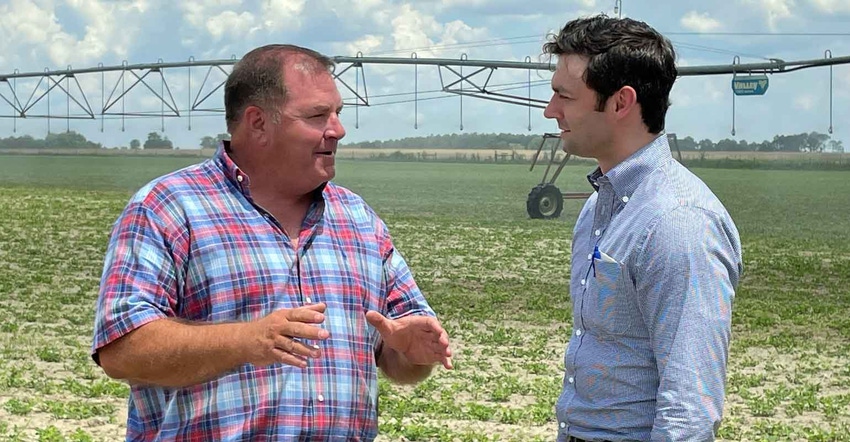
The skyrocketing cost of production, improving access to global markets and workable farm safety net programs in the next farm bill were policy points Georgia peanut farmers recently discussed with their senators.
Earlier this month, U.S. Senator Jon Ossoff, D-Ga., visited Ross Kendrick’s peanut, corn and cotton farm in south Georgia.
“As you know, we're going to be working on the (new) farm bill next year. I'm here to listen to what you need and what your major challenges are. I know these are difficult times in many ways, and a lot of your inputs are going up. And there's workforce issues. I’m here to get to know you a little bit, and that will enable me to be the most effective advocate for you when I get back to voting and working on legislation,” Ossoff told the two dozen farmers and industry reps under Kendrick’s equipment shed June 2.
After seven to eight years of depressed commodity markets, the prices for corn, soybean and cotton have risen, but peanut prices, which are not traded on the futures market, haven’t risen this year, remaining stable with previous years.
Kendrick, a Georgia Peanut Commission board member, told Ossoff the price for important herbicides have more than tripled from last year. A 275-gallon tote of herbicide that cost $4,000 last year cost now more than $14,000. The cost for fuel to run farm equipment has more than doubled year over year. The price for basic fertilizer has more than doubled from last year, too.
Other representatives at Kendrick’s farm that day were from the National Peanut Buying Point Association, American Peanut Shellers Association and regional ag lenders. For the most part, the peanut industry representatives said for the next farm bill they’d like to maintain the framework of the peanut program in Title 1 of the current farm bill, with maybe a better support price.
Ossoff was reminded during the meeting that government support to farmers through the farm bill doesn’t amount to a ‘slush’ fund for farmers. The farmers spend federal support funds to maintain the economic sustainability of their farms, and the money turns over multiple times throughout rural economies.
Ossoff also made stops to talk with Georgia cotton growers and visited a cotton gin.
The current farm bill passed in 2018 and covers through the 2023 crop season. Ossoff and Georgia’s other senator Raphael Warnock, D-Ga., were newly elected in 2020.
The National Cotton Council conducted an interesting analysis, comparing the makeup of Congress in 2018, when the last farm bill became law, to what could be the makeup of Congress after the 2022 midterm elections. Based on Congressional members since then who have left Congress or were beaten, along with the ones in the current Congress who have announced they're not running for reelection, but not accounting for anyone who might lose this cycle, a potential 200 members of the House and 24 senators next year will not have voted on a farm bill before.
U.S. Senate ag subcommittee held a hearing June 9 on “Agricultural Trade: Priorities and Issues Facing America’s Farmers.” Warnock is chairman of the subcommittee.
Karla Thompson testified for the U.S. Peanut Federation. The Camilla, Ga., farmer spoke about export market for peanuts.
In Canada, for example, the U.S. peanut industry has seen an increase in sales in the last few years, but it’s still significantly off when compared to export numbers prior to 2013. In Japan, the U.S. has generally seen a flat trend with significant market swings year after year. The U.S. has experienced a general upward trend in market share for Mexico.
China made a large purchase of U.S. peanuts in 2016 and in 2020, she said, but there is no consistency in U.S. peanut export sales to China. The U.S. market share decreased in the EU from approximately 40% in 2003 to 14% in 2021. Much of the EU market share loss has been to developing countries.
Last year, Warnock and Senator Tommy Tuberville, R-Ala., brought concerns to the USDA and the Office of the U.S. Trade Representative raised by peanut farmers getting products into markets in Europe. “We need federal agencies to better coordinate and step up to help address this issue,” Warnock says in a June 9 statement from the peanut federation.
The House Agriculture Committee began hearings in March to gather feedback on the farm bill’s Commodity Title 1.
About the Author(s)
You May Also Like






